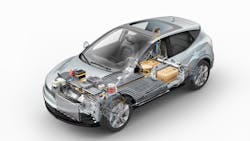At each of McNeil’s Auto Care’s two locations in Utah, a single trained technician is currently assigned to diagnose and repair electric or hybrid electric vehicles.
The system won’t change until the businesses have a high enough volume of EVs and HEVs in relation to internal combustion engine (ICE) vehicles. That way, those two designated technicians get enough practice and experience on a regular basis to help keep them safer around high-voltage components.
Whenever an EV or HEV comes into a shop, technicians also take steps to limit access to other employees. They set up bright orange road cones with hazard bars to barricade off their work bays and use lock boxes to store vehicle keys.
“There’s a lot of education that needs to be done so that everyone understands the potential for danger and serious injury,” says Jake Sorensen, shop manager for McNeil’s for the past 16 years. “That’s going to be more and more important as the EV market continues to grow.”
While ICE vehicles still make up the bulk of work orders at most auto shops, they are gradually losing ground to EVs and HEVs. For technicians and other employees, new or heightened risks include potentially fatal shocks, burns, fires and unexpected vehicle lurches.
In general, shop owners are only in the very early stages of considering protective clauses that might be added to future work agreements. The potential details and phrasing of such clauses also are a question mark, notes Seth Thorson, President of LMV Bavarian, a Minnesota-based automotive service that provides consulting and technical support for technicians.
“Everyone is at the forefront of this,” Thorson says. “We have been meeting with employment attorneys, but I personally think it’s too early to know what we will or won’t need long-term on this.”
In the meantime, shop owners, industry leaders and national safety organizations do have plenty of other advice, including:
- Make sure all technicians who work on EVs and HEVs have completed comprehensive training and certification programs so they are aware of the range of possible hazards. Shop owners or managers also should undergo such training to be available to assist with diagnostics and repairs and answer questions as needed.
- Emphasize the importance of reading manufacturers’ service information on the specific make, model and year of a vehicle before starting a job. Those manuals will include instructions on how to properly follow safety procedures for a particular vehicle, which can vary based on type. For example, manufacturers have developed different mechanisms for disconnecting high-voltage batteries from a vehicle’s main electrical system, as well as color-coding systems to identify high-voltage cables (although those are typically orange or blue). Technicians should never rely on memory as they prepare to address a problem or handle a vehicle component, and if they aren’t sure about a step, they should consult with a manager.
- Plan out a job in advance. A “figure it out along the way” approach to servicing EVs and HEVs doesn’t work well, because a technician could fail to have the right tools and safety equipment at the ready.
- Eliminate the chance of a vehicle turning on accidentally during a job. Turn off the ignition, move key fobs out of the area and wait at least 15 minutes after a battery has been disconnected to begin work.
- Invest in high-quality insulated tools and personal protective equipment for the shop. On the list: hand tools such as screwdrivers, wrenches, pliers and ratchets; heavy-duty safety gloves, face shields and hard hats; and insulated lifts. Shop owners also can purchase insulated retrieval hooks in case a technician is disabled by an electric shock. Check gloves often to ensure there are no issues such as pin holes, cracks, tears or splits that would allow for direct contact between an electrical charge and the skin.
- Create a facility-specific EV fire response plan. Lithium-ion battery fires can spread much more quickly than an ICE vehicle fire, as well as emit toxic fumes or even cause an explosion. Cover procedures for employees should a fire break out, from evacuation plans to the location of PPE.
- Frequently review and enforce safety protocols. Everyone in a shop—from porters and ICE technicians to front desk and parts department staffers – should understand that they at minimum need to get clear permission before entering a work bay with an EV or HEV present. In most cases, they shouldn’t go into that area at all. Obviously, those same rules apply to customers, including the owner of the electric or hybrid vehicle in a bay.
- Research safe handling and storage of used or damaged lithium-ion batteries. Again, referring to specific manufacturer guidelines is critical. The National Highway Traffic Safety Administration and National Fire Protection Association recommend having a separate facility or zone at least 50 feet away from workspaces, other vehicles and combustible materials. That space should be temperature-controlled with a good ventilation system, as EV batteries need air movement both around and underneath them. In addition, batteries should be kept away from chemicals, electrical sources, water and areas where traffic, forklifts or other vehicles commonly pass. Full-battery replacement may require shipping old batteries in fire-protective containers to a dealership or recycling facility.
“As long as everyone takes safety seriously and follows guidelines, we can protect them,” Sorensen says. “There will be a lot of important conversations that need to happen as we move into the future.”
